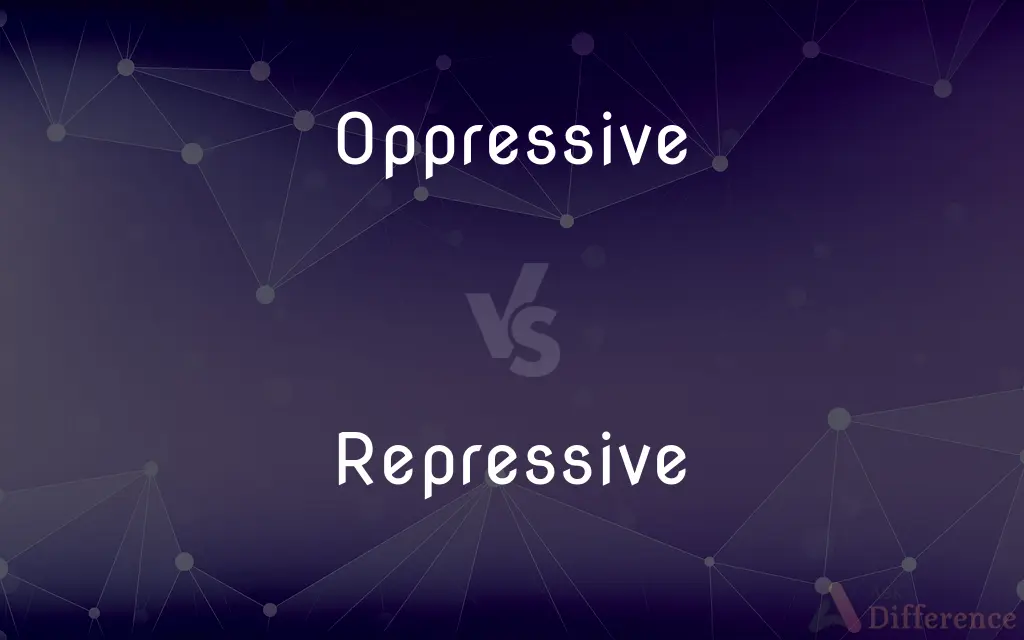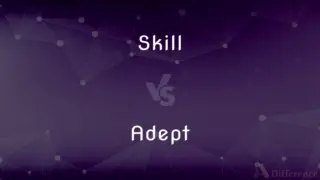Oppressive vs. Repressive — What's the Difference?
By Tayyaba Rehman — Updated on September 25, 2023
Oppressive pertains to unjust or cruel exercise of authority or power, causing discomfort or hardship, while repressive particularly relates to the suppression of behavior, actions, or speech by means of force or intimidation.

Difference Between Oppressive and Repressive
Table of Contents
ADVERTISEMENT
Key Differences
Oppressive and repressive are terms that describe conditions or systems of undue control, but they differ in their scope and approach. Oppressive refers to a condition or a system causing prolonged cruelty, discomfort, or hardship, usually due to an unjust exercise of authority and power. It manifests as excessive restrictions and a lack of freedoms, often leading to the suffering and subjugation of individuals or groups. In contrast, repressive specifically pertains to actions aimed at suppressing undesirable or forbidden behaviors, actions, or speech, often through force, intimidation, or stringent laws.
Understanding the scope of oppressive and repressive reveals more distinctions. Oppressive environments are characterized by pervasive unjust treatment or control, affecting various aspects of life, including social, economic, and political domains. The oppressive system can encompass widespread inequality and discrimination. Repressive, on the other hand, is more focused on containment and prevention, aiming to inhibit the expression of dissent, resistance, or any perceived threats to the prevailing order, primarily through coercive measures and sanctions.
Another aspect is the manner in which oppressive and repressive conditions are experienced. Oppressive conditions often create a suffocating and burdensome atmosphere, undermining the well-being and potential of individuals, making them feel trapped and powerless. Repressive conditions, meanwhile, generate fear and silence, stifling freedom of expression and leading to self-censorship and compliance due to the fear of reprisal or punishment.
In application, oppressive conditions can be seen in systemic racism, gender inequality, and class discrimination, where certain groups are subjected to continuous hardship and injustice. Repressive conditions are evident in authoritarian regimes and institutions where dissent is suppressed, and conformity is enforced through punitive measures, censorship, and surveillance.
In conclusion, while both oppressive and repressive denote undue control and restriction, oppressive is more encompassing, manifesting as prolonged hardship and injustice across various life domains, while repressive is more focused on suppressing dissent and maintaining conformity through force and intimidation.
ADVERTISEMENT
Comparison Chart
Definition
Relating to prolonged cruelty, injustice, or hardship due to excessive control.
Pertaining to suppression of behavior, actions, or speech via force or intimidation.
Scope
Widespread, affecting various aspects of life.
More focused on containment and prevention of specific actions or expressions.
Experience
Creates a burdensome atmosphere; people feel trapped and powerless.
Generates fear and silence, leading to self-censorship and compliance.
Application
Evident in systemic injustices like racism, gender inequality.
Manifests in authoritarian regimes suppressing dissent and enforcing conformity.
Method
Can be subtle or overt, permeating social, economic, political domains.
Primarily overt, employing coercive measures, sanctions, censorship.
Compare with Definitions
Oppressive
Exercising cruel and unjust use of power or authority.
The oppressive regime stifled the voices of the people, causing widespread suffering.
Repressive
Inclined to suppress or control behavior, speech, or actions deemed undesirable or threatening.
The repressive government enacted laws to curb freedom of expression and silence opposition.
Oppressive
Characterized by a lack of freedom and an abundance of unjust restrictions.
The oppressive environment of the company stifled creativity and innovation among employees.
Repressive
Aimed at preventing the expression or development of certain behaviors, actions, or ideas.
The repressive policies stifled any attempts at reform or progress within the society.
Oppressive
Imposing an excessive or severe burden or restriction on someone or something.
The oppressive heat of the desert made every step a monumental effort for the travelers.
Repressive
Enforcing conformity and suppressing dissent or deviation through coercive means.
Living under repressive rule, people learned to conform and avoid any form of resistance.
Oppressive
Exercising power arbitrarily and often unjustly; tyrannical.
Repressive
Relating to actions or policies designed to maintain power by silencing opposition and controlling behavior.
The regime’s repressive actions included the imprisonment of political opponents and activists.
Oppressive
Difficult to cope with; causing hardship or depressed spirits
Oppressive demands.
Repressive
Exerting strict control through intimidation, force, or punitive measures.
The repressive measures included surveillance, censorship, and harsh penalties for dissenters.
Oppressive
Hot and humid; sweltering
An oppressive heat wave.
Repressive
Causing or inclined to cause repression
A repressive dictatorship.
Oppressive
Burdensome or difficult to bear.
The oppressive tax laws made it difficult to start a small company.
Repressive
Serving to repress or suppress; oppressive
Oppressive
Tyrannical or exercising unjust power.
The oppressive land-owners kept a grip on the labourers.
Repressive
Having power, or tending, to repress; as, repressive acts or measures.
Oppressive
Weighing heavily on the spirit; intense, or overwhelming
Will the oppressive heat of summer never end?
Repressive
Restrictive of action;
A repressive regime
An overly strict and inhibiting discipline
Oppressive
Hot and humid of the weather.
Oppressive
Unreasonably burdensome; unjustly severe, rigorous, or harsh; as, oppressive taxes; oppressive exactions of service; an oppressive game law.
Oppressive
Using oppression; tyrannical; as, oppressive authority or commands.
Oppressive
Heavy; overpowering; hard to be borne; creating a sense of heavy burden; as, oppressive grief or woe; oppressive heat or humidity; an oppressive workload.
To ease the soul of one oppressive weight.
Oppressive
Weighing heavily on the senses or spirit;
The atmosphere was oppressive
Oppressive sorrows
Oppressive
Marked by unjust severity or arbitrary behavior;
The oppressive government
Oppressive laws
A tyrannical parent
Tyrannous disregard of human rights
Oppressive
Marked by causing discomfort and hardship to others, especially to a subordinate group.
The oppressive policies disproportionately affected the marginalized communities, depriving them of basic rights.
Oppressive
Resulting in prolonged suffering and hardship due to unjust systems or conditions.
People lived in fear under the oppressive rule, where dissent was not tolerated.
Common Curiosities
Can oppressive systems also be repressive?
Yes, oppressive systems often employ repressive measures to maintain control and suppress dissent.
Can repressive actions be legally justified?
Repressive actions can be legalized by those in power, but legality does not necessarily equate to moral or ethical justification.
Are oppressive systems always supported by the majority?
Not necessarily. Oppressive systems can be maintained by a powerful minority, often against the will of the majority.
Is oppression always intentional?
Oppression can be both intentional, through explicit policies, and unintentional, through systemic and institutionalized inequalities.
Can repressive measures ever be beneficial?
While repressive measures are typically negative, some argue that certain situations may warrant them for maintaining order and security.
Can repressive systems exist in democratic societies?
Yes, even democratic societies can enact repressive policies, suppressing certain behaviors, groups, or ideas.
Is repression always oppressive?
Typically, yes. Repression involves suppressing freedoms and is generally considered a form of oppression.
Can oppressive conditions exist without being overtly repressive?
Yes, oppressive conditions can exist in more subtle forms, like systemic inequalities, without overt repression.
Can oppressive and repressive conditions coexist?
Yes, oppressive conditions often include repressive measures as a means to enforce and maintain oppressive systems.
Can one experience oppression without realizing it?
Yes, individuals might not always be conscious of the oppressive conditions they are subjected to, especially when oppression is normalized.
Can oppressive environments change over time?
Yes, oppressive environments can change, either intensifying or diminishing, due to shifts in power, policies, or social norms.
Can repressive actions lead to social instability?
Yes, repressive actions can incite resistance and unrest, potentially leading to social instability.
Can oppressive conditions be systemic and structural?
Yes, oppression can be deeply ingrained within systems and structures, permeating various aspects of society.
Are repressive measures always overt?
Not always. Repressive measures can also be covert, such as surveillance and censorship.
Share Your Discovery

Previous Comparison
Bomb vs. Bombshell
Next Comparison
Skill vs. AdeptAuthor Spotlight
Written by
Tayyaba RehmanTayyaba Rehman is a distinguished writer, currently serving as a primary contributor to askdifference.com. As a researcher in semantics and etymology, Tayyaba's passion for the complexity of languages and their distinctions has found a perfect home on the platform. Tayyaba delves into the intricacies of language, distinguishing between commonly confused words and phrases, thereby providing clarity for readers worldwide.














































